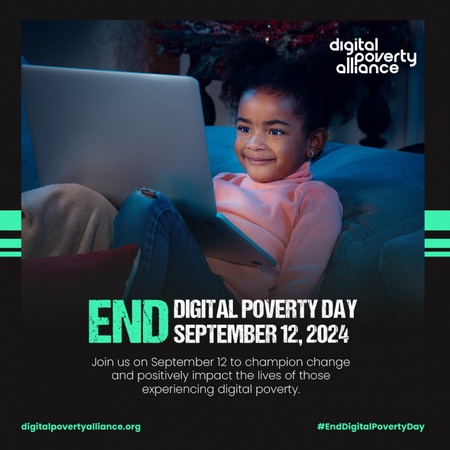What is Digital Poverty?
The Digital Poverty Alliance defines digital poverty as “the inability to interact with the online world fully, when, where, and how an individual needs to.”
Ofcom’s 2022 Digital Exclusion Review sets out some of the key barriers. These include the affordability of devices and internet packages, access to adequate internet connections at home and elsewhere, and the digital skills to navigate the online environment with confidence and safety. There is a complex interplay of factors involved in digital poverty, including socioeconomic status, age, geography, disability, educational attainment, literacy and language, and housing circumstances.
In 2021, around 1.7 million UK households (1 in 20 households) had no mobile or broadband internet access at home. Around 77% of this group did not own a connected device.
Libraries are championing digital inclusion across our communities. Please read on for details on the variety of services that can help you! We have also created a reading list containing lots of further reading on digital inclusion.
Digital inclusion and empowerment
The University donates our old equipment and hardware to Reusing IT. They provide devices to users in Scotland and across Africa. You can apply for a refurbished device by getting in contact with them using the details on their website.
Funding
There’s university funding available for any student facing hardship. Money Matters have a Digital Inclusion fund and welcome all applications. There's also an emergency fund that can be accessed any time. Please see the Money Matters website for details on how to apply for funding.
You can discuss your circumstances informally with a student support advisor, they can give financial advice and help connect you with other services. Arrange an appointment by emailing hardship@abdn.ac.uk.
Hardware
Windows laptops are available to borrow from 3 locations across campus. These are just for 24-hour loan (or until the device battery runs out), but it’s possible to return a device and take out another one immediately. You only need your student card to borrow a laptop. Find more information on the Lapsafe loan laptops webpage.
The university’s Assistive Technology team provide specialist hardware, software and training for staff and students. You can book an initial online appointment with them to discuss your requirements, and more information can be found on the Assistive Technology webpages.
There are Digital Inclusion Hubs across Aberdeen. They offer a range of practical support, providing free mobile SIMs and data through the National Databank, free refurbished devices through the National Device Bank, and free digital skills training. Visit your local Hub to see how they can help you! You can view a map of local Hubs at the Good Things Foundation website.
Aberdeen City Libraries provide free computer and wifi access at all community libraries. They also offer free access to a range of online learning resources. All university students are welcome to join the library service! Fill out the online form to join today.
Software
The University’s Toolkit contains lots of guidance on how best to use digital tools. Use these to help level up your digital skills! There are videos, written guides and links to further reading on over 130 resources. Explore these today at the Toolkit webpages.
The Digital Skills team provide a wide range of free training courses, online or in-person, to students and staff. You can browse upcoming training on the course booking system.
You can find a wide range of free learning resources online. Get started today with Microsoft Learn, Grow with Google, or iDEA.


